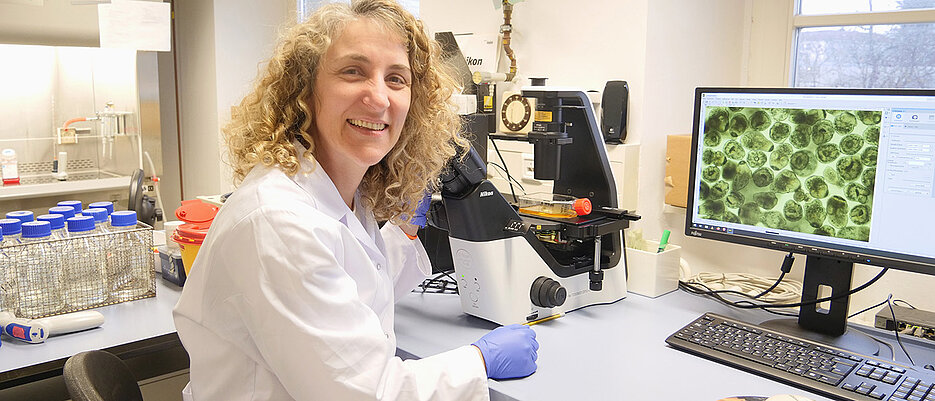On the Trail of the Tapeworms
30.08.2024Dr. Julia Loos is a biologist and guest at the University of Würzburg. The Humboldt Fellow is supporting Professor Klaus Brehm's research group in the molecular characterization of a clinically important tapeworm species.

It's a horror scenario: a tapeworm nests in a person and deprives them of important nutrients in order to maintain itself and grow. Such parasites can also cause diseases such as liver cirrhosis and allergic reactions. A host – an infected person – often only notices an infestation after several years, if not decades.
While others hope never to be confronted with a tapeworm in their lifetime, Dr. Julia Loos sees the parasites as the foundation of her work: She is a biologist specializing in tropical infectious disease pathogens and is currently a guest at the Julius-Maximilians-Universität Würzburg. With a fellowship from the Alexander von Humboldt Foundation, the Argentinian is working in the research group of Klaus Brehm, Professor of Medical Parasitology at the Department of Hygiene and Microbiology.
Her fascination with biology began at an early age: “I went to a technically oriented high school and we were allowed to try our hand at laboratory workshops. From then on, I was sure that I would make the laboratory my workplace,” says the fellowship holder.
Decoding the Dog Tapeworm
At the University of Mar del Plata in Argentina, Dr. Loos is researching the dog tapeworm: “This parasite is responsible for cystic echinococcosis - a worldwide disease of public health concern with a high impact and incidence in my home country,” says the biologist. During an infection, cysts form in the affected organ - often in the liver or lungs. If liquid cyst contents leak out, this can lead to mild allergic reactions and even anaphylactic shock.
Loos' research has helped to understand the parasite down to the molecular level: “On the one hand, our team has carried out a cellular and molecular description of the autophagic process -a mechanism of cellular self-degradation that plays an important role in cell survival and maintenance,” says Loos, “on the other hand, we have characterized key regulators that control cell growth and energy balance.” In addition, she was able to prove that a diabetes drug suppresses the development of the dog tapeworm.
Stopover in Würzburg
Dr. Loos supports Professor Brehm's team with research to the larvae of the fox tapeworm. These settle in the liver of the host and are responsible for alveolar echinococcosis - a disease that is fatal if left untreated. The tapeworm larvae grow like a malignant tumor that can spread to other organs.
The research group has already proposed the existence of a heterogeneous population of stem cells in the parasite. Building on this, the laboratory is initiating the next research steps: “Over the next two years of my stay, we will molecularly characterize the different cell types of the tapeworm, focusing on the different stem cell subtypes, to create a so-called single-cell atlas,” says Loos. This could help to identify parasitic targets and to develop effective strategies for treating the disease.
To Würzburg with the Humboldt Fellowship
The biologist is receiving funding through a fellowship from the Alexander von Humboldt Foundation. The fellowship runs from November 1, 2024 to October 31, 2026, and the choice of research location was easy for the scientist: “I already had a three-month research stay in Professor Brehm's working group in 2015. If you add the reputation of the University of Würzburg coupled with the group's expertise in the field of echinococcosis research, the decision was clear for me,” says the scholarship holder.







